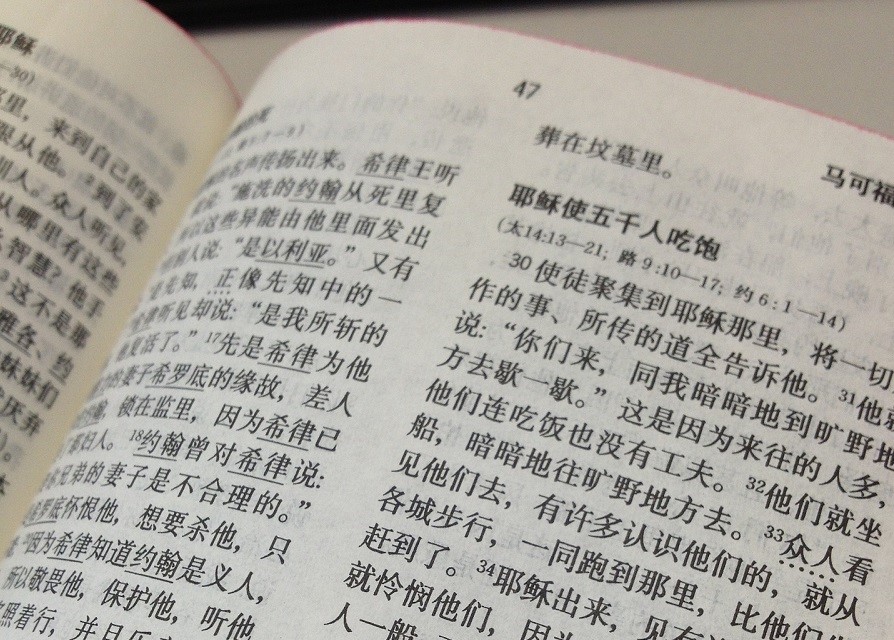 BEIJING – The People’s Republic of China released a white paper today entitled, “China’s Policies and Practices on Protecting Freedom of Religious Belief.”
BEIJING – The People’s Republic of China released a white paper today entitled, “China’s Policies and Practices on Protecting Freedom of Religious Belief.”
A title like that might encourage Christians about the prospects of sharing the Gospel in mainland China. However, this may be a classic example of not judging a white paper by its cover page.
On March 28th, national leaders declared that “one of its biggest tasks in the coming years is to enhance Chinese-style Christianity by reinterpreting and retranslating the Bible. This news appeared in an official document released by China’s State Administration for Religious Affairs. Two days later, Bibles started disappearing from Chinese e-commerce websites.
Believers should be aware the “Theoretically speaking, the Bible is an illegal publication” in China. Reporters investigating the elimination of Bibles for sale indicate that copies of the Quran are still available on the websites from which the Bible has been removed.
Although the whitepaper touts the patient acceptance of all non-extremist religions, the concluding summary includes a somewhat innocuous remark that “China will fully implement the Party’s basic policy on religious affairs, uphold the principle that religions in China must be Chinese in orientation, and provide active guidance to religions to that they can adapt themselves to the socialist society.” Subsequent readings indicate a subtle, but obvious point that religions must conform to Chinese law and socialism.
Elsewhere, the paper says that people of all faiths “should adhere to the direction of localizing the religion, practice the core values of socialism, develop and expand the fine Chinese tradition and actively explore the religious thought which accords with China’s national circumstances.”
In another paragraph, the paper states that “actively guiding religions in adapting to the socialist society means guiding religious believers to be subordinate to and serve the overall interests of the nation and the Chinese people.”
A major problem here is that the Communist Part advocates atheism. This is essential to correctly interpret party policies.
Furthermore, the Chinese constitution clearly states that China’s religious groups and religious affairs cannot be controlled by foreign forces, and (they) should not interfere in Chinese religious affairs in any way.”
The document expands on that premise with this promise: “The Chinese government will resolutely oppose and deal with foreign organizations and individuals engaging in activities which violate China’s Constitution, laws, regulations and policies, their attempts to control China’s religious organizations, to interfere in China’s religious affairs and to subvert the Chinese government and socialist system under the guise of religion.”
Beyond the scope of churches, The Law of the People’s Republic of China on the Administration of Activities of Overseas Non-Governmental Organizations Within China forbids NGOs from engaging in or sponsoring religious activities.
All of this lays the groundwork for bringing Christianity into conformity with the preparation and reinterpretation of the Bible so that it says nothing offensive or in perceived opposition to the philosophy and objectives of the Chinese ruling authority.
Sources:
- The Christian Post, Christians Outraged as China Pulls Bibles From Bookstores to Comply With ‘Values of Socialism’
- The State Council Information Office of the People’s Republic of China, Full text: China’s Policies and Practices on Protecting Freedom of Religious Belief
- ABC News (Australia), Bibles pulled from China’s online bookstores as Beijing releases white paper on religious policy
- Quartz, China says it protects religious freedom, but the Bible is disappearing from online bookstores
- Breitbart, China Pulls Bibles from Online Bookstores in Crackdown on Christianity
- S Daily News, Bibles pulled from China’s online bookstores as Beijing releases white paper on religious policy
- China Daily, Protecting freedom of religion belief
- The Christian Times, ‘Foreign forces’ will not be allowed to control China’s religious affairs, says official
- Radio Free Asia, Religions Must be ‘Subordinate’ to Communist Party, Says China




